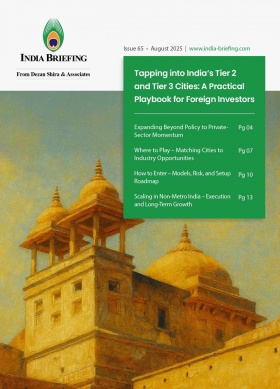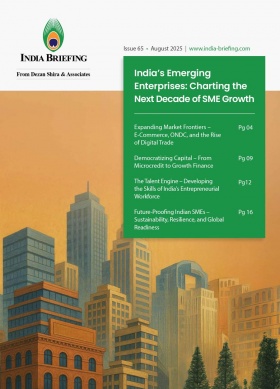India’s Corporate Data Management Scheme – MCA to Open Third Party Bidding on September 30
The Indian government will soon invite third-party bids under the Corporate Data Management Scheme (CDMS), an initiative launched in FY 2015–16 to upgrade the MCA21 system into a comprehensive data warehouse and analytics platform. The scheme engages independent agencies to provide portal support and ensure compliance and data security for companies registered in India. At the core of CDMS is the Corporate Data Management (CDM) portal, a centralized platform that offers structured access to corporate data for market intelligence, business analytics, and real-time reporting.
The Union Ministry of Corporate Affairs (MCA) will open third-party bidding on September 30, 2025, as part of the evaluation process for the Corporate Data Management Scheme, or CDMS. The scheme was introduced to upgrade the MCA21 transactional system into a comprehensive data warehouse and analytics platform. Its primary objective is to enhance transparency and improve accessibility to India’s corporate database.
What is the corporate data management scheme (CDMS)?
All companies incorporated in India are required to electronically file their incorporation documents, compliance records, approvals, and annual statutory returns through the MCA21 system, a single-window platform for corporate compliance and transparency. Over time, this has created a vast digital repository of corporate information.
To harness this data, the CDMS was launched, with the CDM portal serving as its central platform to provide structured access to India’s corporate sector data. It offers policymakers, regulators, researchers, and the public reliable financial and non-financial corporate data.
The initiative is closely aligned with India’s National Data Sharing and Accessibility Policy (NDSAP), 2012 and strengthens governance by enabling:
- Data mining and business intelligence tools for in-depth analysis;
- Real-time analytics and customized reporting to support evidence-based decision-making; and
- Collaboration across government agencies, corporations, and research institutions for more informed policies and business strategies.
ALSO READ: Choosing the Right Business Entity in India: Pvt Ltd, LLP, or OPC?
Third-party bidding process for CDM portal
The selection of vendors for managing MCA’s CDM portal generally follows a structured government procurement process. This is typically carried out through the Government e-Marketplace (GeM) platform, where interested service providers respond to a formal Request for Proposal (RFP). The process involves multiple stages, including bid submission, technical and financial evaluation, and contract finalization, while also addressing critical issues such as data security, compliance, and vendor risk management.
General steps in the bidding process
The procuring agency, such as the MCA, releases an RFP document outlining the scope of work, which may include data analytics, portal development, and system maintenance. The document specifies technical and financial requirements, submission procedures, and evaluation criteria.
A pre-bid phase allows potential bidders to raise queries regarding the RFP. Clarifications are usually addressed in a pre-bid meeting to ensure transparency and uniform understanding.
Eligibility criteria under the bidding process
Under the CDM scheme, bidders must meet defined eligibility standards, such as valid government registrations (Permanent Account Number, Goods and Services Tax) and a clean compliance record. Submissions typically include two components: a technical proposal and a financial proposal, each filed separately.
Technical bidding process
|
Eligibility Criteria under Technical Bidding |
||
|
Criteria |
Requirements |
Documents required |
|
Registration |
Must be a registered entity (private/public limited company, partnership firm, society, autonomous body, or institution) |
Certificate of registration, PAN, GST |
|
Experience |
Minimum 5 years’ experience in IT or data management project evaluations |
Completion certificates/work orders |
|
Restrictions |
No consortiums, joint ventures, or individual applications allowed |
Self-declaration |
|
Compliance |
Not blacklisted or debarred; no pending litigation with government departments |
Self-certification (Annexure-1) |
|
Track record |
Evaluated at least 3 central/state schemes/projects in last 5 years; Startups: 2 schemes≥INR 250 million (US$2.8 million) |
Work orders/certificates, DPIIT recognition (for startups) |
|
Resources |
At least 20 employees; evaluators: B.Tech/B.E/MBA/Master’s in Statistics/Economics/Mathematics; researchers: Bachelor’s in relevant fields |
Team portfolios |
|
Expertise |
Proven experience in data governance, analytics, and BI solutions |
Project completion certificates |
|
Presence |
At least one office in Delhi |
Address proof, PAN & GST |
Financial bidding process
As part of the bidding process, bidders are required to submit a bid security/earnest money deposit (EMD) of INR 50,000 (US$566.41). The EMD may be furnished through insurance surety bonds, demand drafts, fixed deposit receipts, banker’s checks, or bank guarantees (including e-bank guarantees) issued by a scheduled commercial bank. The instrument must be drawn in favor of the pay and accounts office (PAO) of MCA and remain valid for at least 45 days beyond the final bid validity period.
Key considerations
- Data security and risk controls: Vendors must establish strong safeguards to protect sensitive corporate data and address third-party risk exposures.
- Service level agreements (SLAs): Contracts clearly outline performance expectations, with penalties for non-compliance or service failures.
- Regulatory and legal compliance: Service providers must comply with applicable data protection laws, IT regulations, and other statutory frameworks.
- Ongoing vendor management: The procuring agency must monitor vendor performance, security posture, and compliance throughout the contract lifecycle.
Third-party evaluation
Periodic evaluation has been a core feature of the CDM. The last third-party evaluation was carried out in 2020. For the current cycle (2021–22 to 2025–26), aligned with the 15th Finance Commission period, the Data Monitoring and Evaluation Office (DMEO) of NITI Aayog has been given charge to conduct a comprehensive review of the scheme’s performance. The bidding process on September 30, 2025, is a step toward independent assessment of how effectively CDM has improved data transparency, policy support, and governance.
Budgetary utilization and other challenges under the CDMS
In the Union Budget of FY 2025–26, the central government allocated INR 115.61 billion (US$1.3 billion) to the MCA. Of this, INR 110 million (US$1.24 million) has been specifically earmarked for the CDM scheme. Despite this higher allocation, a Parliamentary Committee has raised concerns about persistent underutilization of funds. In previous years, large portions of the MCA’s budget were surrendered due to limited spending capacity—an issue that risks undermining the effective rollout of initiatives like CDM.
Beyond financial utilization, the scheme has also struggled with a shortage and retention of skilled professionals. Since its launch, remuneration for technical and functional experts has not been revised, making it difficult to retain specialists in data science, analytics, and IT. This talent gap has constrained implementation capacity and slowed the scheme’s progress.
Acknowledging the challenge, the MCA has proposed a revision of the pay structure for technical professionals. If approved, this measure is expected to ease manpower shortages, strengthen institutional capacity, and improve the delivery of the scheme’s objectives.
Outlook
The CDM scheme has the potential to become the backbone of India’s corporate data ecosystem—supporting evidence-based policymaking, boosting investor confidence, and fostering a more transparent corporate environment. However, its success will depend on:
- Timely completion of third-party evaluations;
- Strengthened budgetary utilization mechanisms; and
- Ensuring competitive remuneration to attract and retain talent.
As the MCA prepares for a fresh round of independent evaluation, stakeholders across government, business, and academia will be closely watching how the CDM Scheme evolves into a more robust, efficient, and transparent data-driven governance tool.
(US$1 = INR 88.27)
About Us
India Briefing is one of five regional publications under the Asia Briefing brand. It is supported by Dezan Shira & Associates, a pan-Asia, multi-disciplinary professional services firm that assists foreign investors throughout Asia, including through offices in Delhi, Mumbai, and Bengaluru in India. Dezan Shira & Associates also maintains offices or has alliance partners assisting foreign investors in China, Hong Kong SAR, Vietnam, Indonesia, Singapore, Malaysia, Mongolia, Dubai (UAE), Japan, South Korea, Nepal, The Philippines, Sri Lanka, Thailand, Italy, Germany, Bangladesh, Australia, United States, and United Kingdom and Ireland.
For a complimentary subscription to India Briefing’s content products, please click here. For support with establishing a business in India or for assistance in analyzing and entering markets, please contact the firm at india@dezshira.com or visit our website at www.dezshira.com.
- Previous Article How Indian Firms Can Set Up in Vietnam: Practical Insights for Businesses
- Next Article Input Tax Credit Treatment Under GST Rate Rationalization












